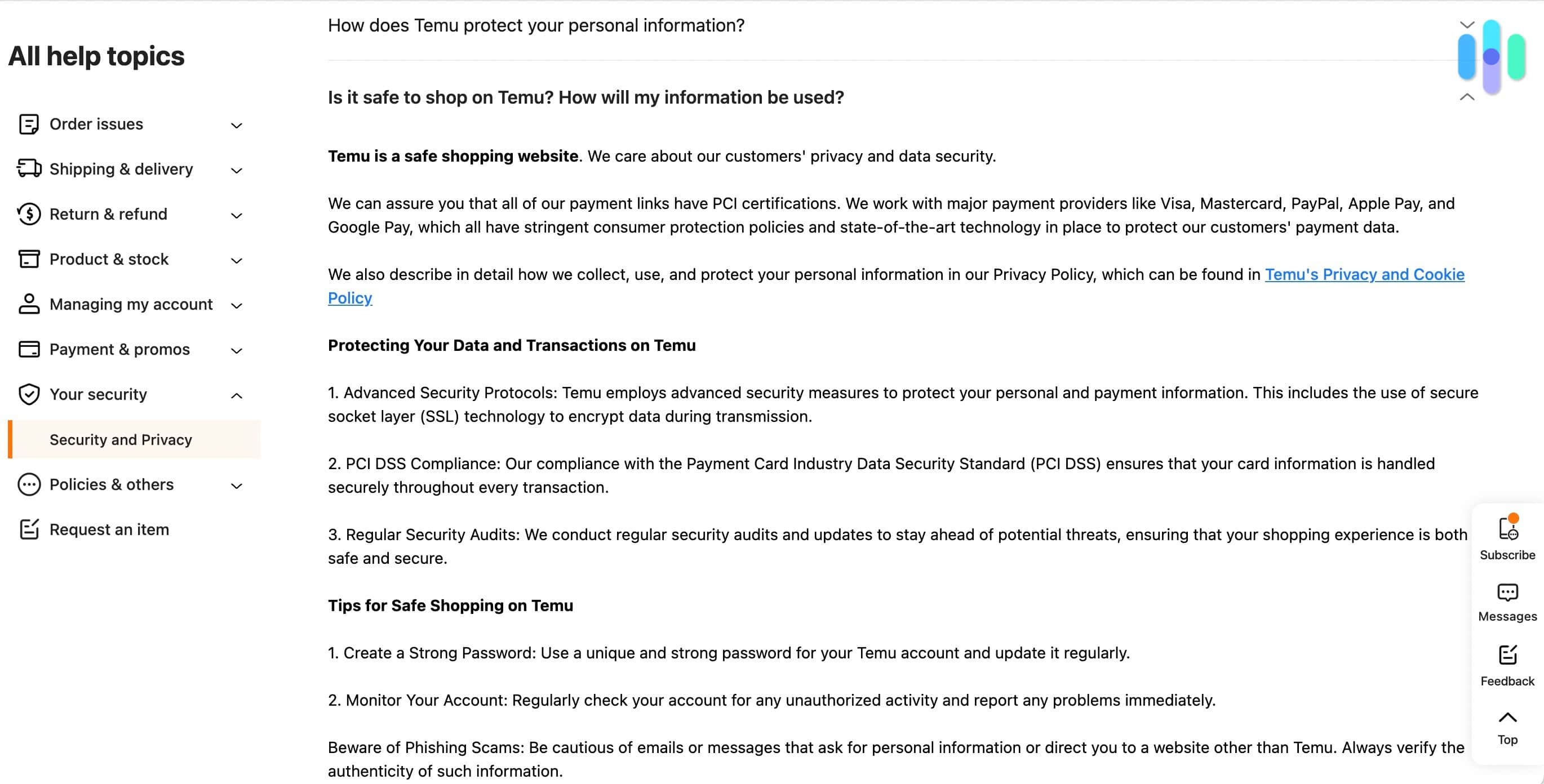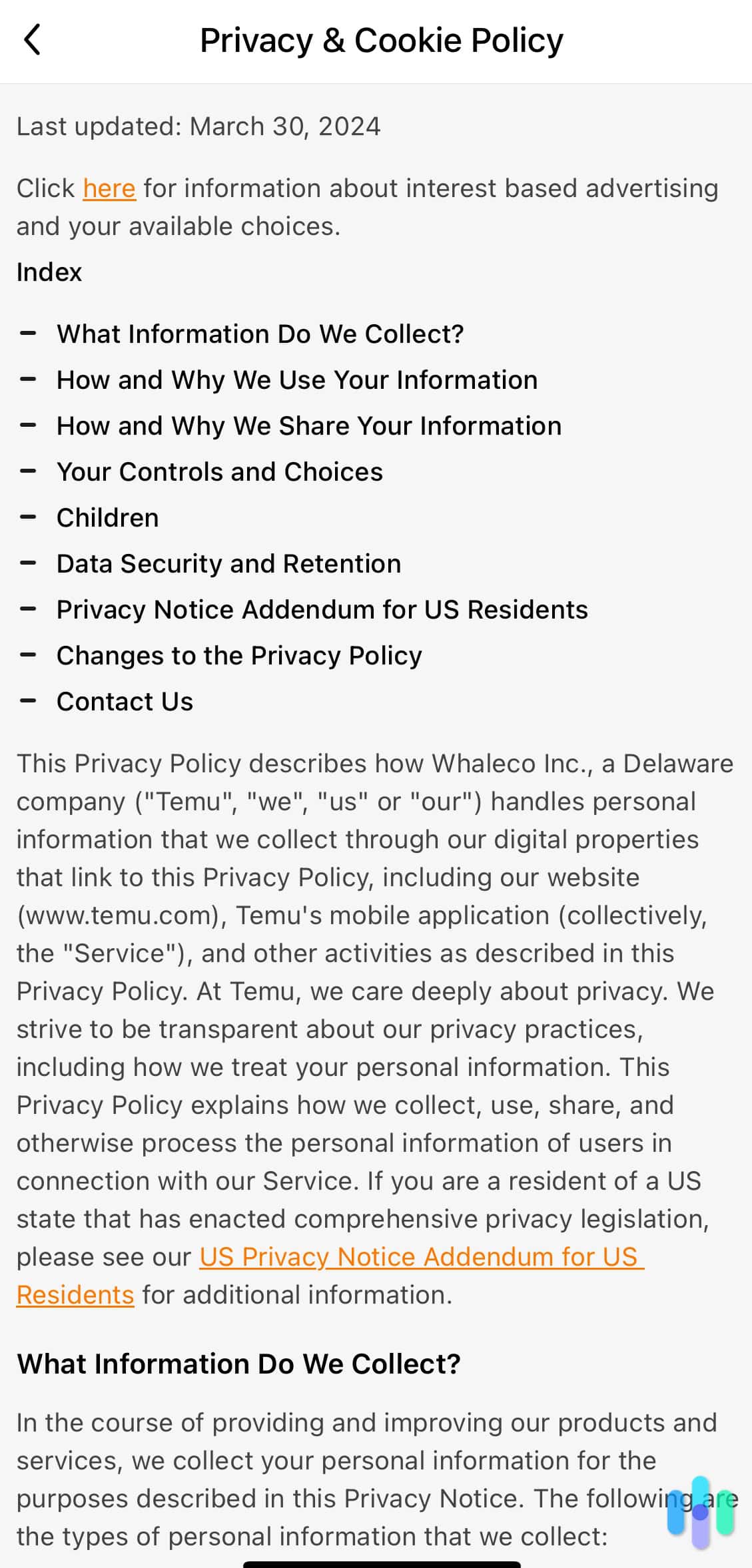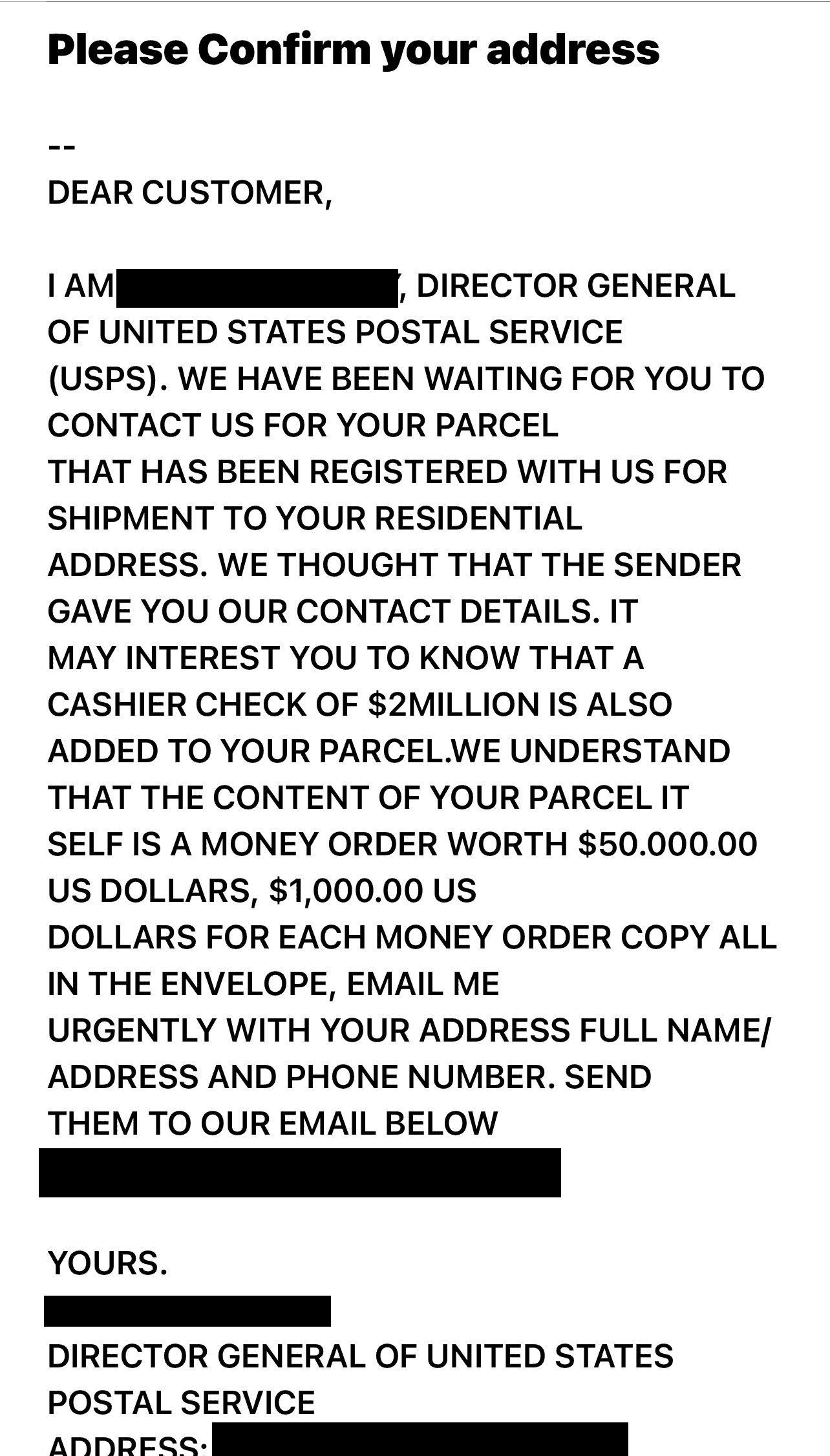Offering a massive range of products to consumers worldwide, Temu stands out as a prominent online shopping player alongside other heavy hitters like Amazon, Shein, and AliExpress. (We’ve also investigated the safety of AliExpress in case you were wondering.) To compete with these giants, Temu secured its first Super Bowl ad this past year. As with any major online retailer, Temu has garnered praise and criticism from customers and industry experts regarding its products, pricing, and privacy.
When it comes to online shopping, knowing you’re safe when you hand over your payment deets is essential. After all, general online safety advice says to avoid giving your credit card information to untrustworthy sources. We’re going to examine the pros and cons of shopping with Temu and highlight its strengths and weaknesses. Whether you’re considering buying on Temu or you’re in the tire-kicking stage, this article aims to provide you with more information to answer the question, “Is Temu safe?”
Temu Facts
| When was Temu founded? | Entered U.S. market in 2022. Parent company PDD Holdings was founded in 2015 |
|---|---|
| Where is Temu located? | Incorporated (U.S.): Delaware
Headquarters (U.S.): Boston |
| Who owns Temu? | Colin Huang, founder and owner |
| How many people use Temu globally? | 100 million users as of April 2023 |
| Company revenue in 2023 | Over $34 billion USD |
What is Temu?
Temu sets itself apart by offering its products at (sometimes suspiciously) low prices, mostly from unknown brands. It offers everything from fashion and beauty products to home goods and electronics. Temu is safe to use, but like any digital marketplace, it’s not a risk-free experience. While you don’t have to be on the lookout for romance scams, you do need to watch out for spyware, like keyloggers, that can steal payment information or malware designed to hack online accounts. We recommend using antivirus software to protect your accounts and devices against these types of exploits. Here are a few we recommend next time you go on an online shopping spree.
Green Flags
Temu offers several positives for consumers seeking a convenient and reliable online retail experience.
Easy Navigation
Although Temu is a Chinese-backed company, the American-facing website shies away from the typical Chinese online shopping experience of busy and overwhelming landing pages. With a more straightforward layout, the U.S. Temu site provides less confusion and more seamless shopping.
Looking good! Temu provides a shopping environment that makes it easier for shoppers to feel in control while browsing online and purchasing items.
Did You Know? Generation Z represents the largest demographic within Temu’s user base, comprising 35 percent of its audience. This is attributed to its game-like interface, convenient app, and appealing discounts.1
Responsive Customer Service
The customer service section of the Temu website addresses various questions, such as what to do if an item is missing from your order, you receive the wrong item, or you receive a damaged item, and how to protect yourself from online phishing and texting scams.
Always be careful when interacting with a chatbot. They can and have been compromised by bad actors who try to get your credit card information. That’s why we wrote an entire guide to staying safe from chatbot scams.
Temu offers easy-to-find customer service, with responsive support staff ready to assist with inquiries, order tracking, and returns.
Data Protection
The platform also prioritizes customer security by implementing robust data protection measures to safeguard personal information.

Temu’s use of 3D Secure (3DS) provides authentication for credit card transactions and involves customer identity verification. Temu also adheres to the Payment Card Industry Data Security Standard (PCI DSS) for handling all credit card data. Encryption, access control, and secure data storage are additional measures mentioned on the Temu website. For your own data encryption when connecting to Temu, we recommend using NordVPN, one of our favorite VPNs for daily use.
To help defend against cybersecurity vulnerabilities, Temu has also partnered with HackerOne to implement data security.
Variety of Payment Options
Temu offers a large variety of payment options. These include major credit and debit cards (Visa, Mastercard, Discover, American Express), Temu Credit, Apple Pay, Google Pay, PayPal, CashApp, and Venmo.
Pro Tip: If you do a lot of online shopping with credit cards, we recommend using one of our expert-tested credit protection services to make sure your credit cards never fall into the wrong hands.
Cha-chiiiing! By providing different ways to pay, Temu gives you convenience and peace of mind by letting you use your preferred payment method.
Red Flags
Shopping online means it’s essential to weigh the cons alongside the pros. So, in the spirit of keeping all things equal, here are some of the downsides to shopping with Temu.
Information Collection
Arguably, the biggest negative aspect of shopping online with Temu is their collection of your Personally Identifiable Information (PII).
We’ve listed the following information under the “Red Flags” section so you can better understand how much of your personal data Temu tracks.
On a positive note, Temu is incredibly transparent and detailed about what they collect, when, and for what purpose. On a negative note, Temu is currently involved in several class action lawsuits involving its consumer data collection and sharing practices.

Information That You Provide
According to the Temu Privacy Policy,2 the company can collect information you provide when you “create an account, place an order at checkout, contact us directly, or otherwise use the Service.”
This information can come from your Temu use:
| Data category | Information collected |
|---|---|
| Account and profile | Email address, mobile phone number, profile photo, username |
| Purchases | Transaction history, transaction payment information, shipping address (city, state, country of residence, postal code), and contact information (name, mobile phone number) |
| Customer support activity | Support functions and communications, including social media |
| User-generated content | Profile pictures, photos, images, videos, comments, questions, messages, and other content or information that you generate or transmit |
| Promotion and event participation | Contact information offered through participation in a contest, promotion, or survey |
| Other data | Any data not explicitly listed in Temu’s Privacy Policy |
You’d be forgiven for thinking that the last item sounds a bit sketchy. But it’s more of a catch-all category that explains itself by saying, “We will use other data that you provide as described in this Privacy Policy or for any other purpose disclosed to you at the time we collect your information.” Clauses like this are typical of big tech companies that collect your data.
Information From Third-Party Sources
Temu also collects your information from outside third-party sources, which can include:
- Data Providers: Organizations that collect and provide demographic data to help detect fraud
- Affiliate Partners: Influencers and promoters who participate in paid affiliate programs
- Marketing Partners: Joint marketing partners and event co-sponsors
- U.S. Public Sources: Data taken from a government agency or public records for credit checks
- Other Third-Party Services: Social media companies for logging in, logistics services for shipping
Information Collected Automatically
Automatically collected information involves data taken from your personal devices (model, operating system, unique identifiers), usage information (pages you’ve viewed, time spent on those pages, the source you arrived from), and location data (approximate location and often your IP address).
Counterfeit Items
One primary concern is the potential for fraudulent sellers and scammers on the platform, which could lead to customers receiving counterfeit products — items that are fake or low quality. While it’s not as bad as account takeover fraud, nobody wants to waste money on counterfeit goods. Common sense may fly out the window when faced with the opportunity to purchase an iPhone 15 Pro for $19.99 plus tax.
Sorry to be a downer, but if it seems too good to be true, it probably is.
FYI: Products aren’t the only thing that criminals counterfeit. Brazen criminals make counterfeit credit cards with real numbers. We found out that it’s actually one of the most common types of credit card when we made our 2025 credit card fraud report.
Inaccurate Product Descriptions
Additionally, there may be issues with product accuracy, and the item you receive may not match the description or images provided on the website. I’m sure we’ve all experienced the joy of purchasing a delightful kitchen rug only to find out on arrival that it’s the size of a small doormat. (It wasn’t just us, was it?)
Paying attention to the sizes and symbols used in product descriptions can help avoid issues like this. If the description says “10 x 12,” do they mean 10 feet x 12 feet or 10 inches x 12 inches? Inaccurate product descriptions can sometimes be a precursor to fraudulent sellers and potential scams.
Customer Service
Or, in some cases, the lack thereof. Although the customer service feature is easy to find and responsive, some customer experiences with Temu have been mixed. Challenges involve unanswered questions and issues that can’t be resolved.
On the surface, this may not seem like a safety issue. But if you need customer service immediately due to credit card fraud, you don’t want to wait around for a response. That’s why we recommend using a top-tier identity protection service with fraud detection when shopping online.
Did You Know? The Better Business Bureau has assigned Temu a C+ rating, taking into account 1,748 customer complaints closed in the past year.3 Unfortunately, that’s not a very impressive score.
Sharing Is Caring, Sometimes
Most of this information collection isn’t surprising; after all, you’re shopping online. What can be a shock is how much information is tracked and used. Temu states that they also share your data with affiliates, service providers, payment processors, business partners, and merchandise partners. That is, unfortunately, standard practice in the e-commerce industry even though it’s not great for your internet and data privacy.
What could be concerning to you is that Temu also shares your data with third-party advertising, marketing, and analytics companies. Note the word “shares” — not “sells.” Learning about and opting out of having your information shared is left solely in the hands of the consumer.
Practically speaking, taking steps to protect your personal data and account details is about the only way to protect yourself online. You could also avoid online shopping altogether, which, if you’re anything like us, is just not a possibility.
It’s a Wrap!
Alongside a massive choice of products, Temu provides convenient website navigation, plenty of payment options, accessible customer service, and quality data protection.
Flip the coin, and we see that Temu can suffer from counterfeit goods, inaccurate product descriptions, and customer service that may not go the full mile. All while collecting and sometimes sharing a mindblowing amount of your data and information.
Ultimately, the choice to shop with Temu is your wallet’s decision, and it should be made after careful consideration of the flags discussed in this analysis. Remember to prioritize your specific needs and preferences when evaluating whether Temu is the right choice for your online shopping extravaganza.
Frequently Asked Questions About Temu
-
Is Temu a scam company?
Nope. It’s completely legitimate and incredibly successful. The sheer size of Temu is where things get tricky. Consumers can get scammed easily, which is why Temu encourages you to protect your data and shop sensibly.
-
Where are the Temu sellers and wholesalers based?
Globally. The main goal of Temu is to stay cheap and cheerful, so they partner up with providers all over the world to remain cheap and fast.
-
Has there been any data breaches at Temu?
Not that we could find. As mentioned above, it should be noted that Temu is involved in several class action lawsuits, which involve consumer data.
-
Can you buy name-brand items on Temu?
No, not really. If it looks like a name brand (Nike, Lululemon, Coach, etc.), it’s likely counterfeit. That’s not to say you won’t find some great items on Temu, but legitimate name-brand items aren’t on the menu. That’s how they keep things cheap and cheerful.
-
Can I sell goods on Temu?
Yes, you can, but it’s not set up like Amazon or Etsy. The merchandisers and sellers on Temu are usually located overseas and have access to large amounts of cheaper items. While you can set up a seller account on Temu, you should do some thorough research to make sure it’ll be a profitable venture.









